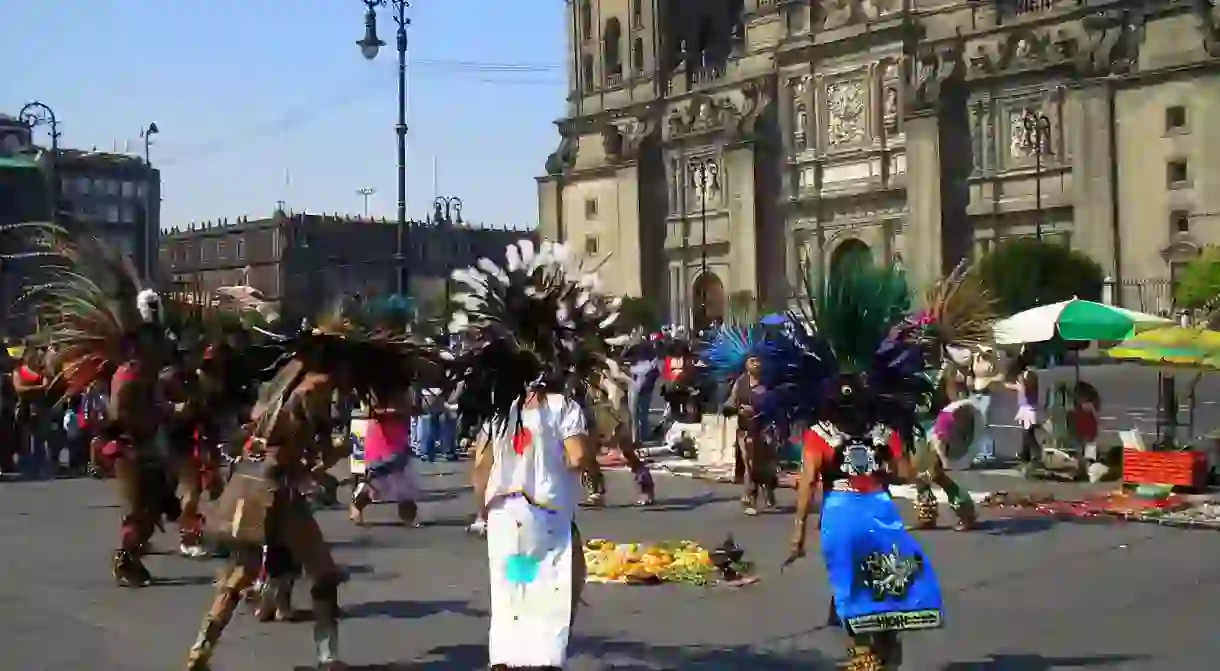A Brief Introduction to Mexico City’s Aztec Dancers

Stroll through Mexico City, and you’re sure to hear the percussion-led rhythm or spot the lively movements of groups of elaborately dressed dancers at one point or another. Often referred to as the ‘Aztec Dancers’ of Mexico City, they are technically known as concheros and have a rich history. Here’s everything you need to know about the contemporary concheros, aka Mexico City’s ‘Aztec Dancers’, including where to see them.
History
While many labour under the illusion that the Aztec Dancers of the Mexican capital are merely there for the amusement of tourists, the dancers and the dance itself have a long and rich history, one which colonial Christian’s tried to destroy. Although they’re now known as concheros, this wasn’t always the case for these dancers. In fact, the name concheros stems from the Christian introduction of a type of guitar known as a concha into their dancing rituals; however, this was no kind-hearted act, as the intent was to subvert the traditional rituals and religion of the natives. Even so, the concheros dancers believe that fighting ignorance, rather than governments and religion, is the way to live life.

So, while the contemporary Aztec Dancers of Mexico City are a far cry from the concheros of the past, they take much of their inspiration from ancient ritual and traditional dance, bringing it to a modern audience and reminding everyone about Mexico’s Aztec (and mestizo) past.

Clothing
Easily spotted from a mile away, the Aztec Dancers of Mexico City are bedecked in feathered headdresses (penachos), scanty pieces of cloth decorated with vibrant figures and designs, as well as the famed shell-embellished ankle cuffs that provide much of the musical beat for the dance. Female dancers typically use huipiles too, and both men and women sometimes incorporate body paint into their look, which more accurately represents the god or animal they’re honouring. However, the outfits can change from person to person and group to group, as they’re decided based on social status (not class).

Dance
The dance itself is enthralling and genuinely entertaining; it’s overflowing with life, percussion-heavy beats and filled with religious significance to boot. Each routine reflects the duality of the Aztec culture, with women, the night, the jaguar and the earth on one side and men, the day, the eagle and water on the other, and features circles heavily.
However, entertainment is not the principal objective; rather, honouring the Gods and forming a link with the cosmos is the overall goal of the concheros’ dance. For that reason, the four cardinal points are blessed before the start of the routine and steps are dedicated to the harvest, fertility, earth, fire and water. There are also several instruments incorporated into the performance, such as the concha de armadillo guitar from which they take their name, the huehuétl and teponaztle drums, as well as ayoyote and ayacachtli maracas/percussion instruments.
Where to see them
The most common place to catch a glimpse of these hypnotising dancers is in Mexico City’s Zocalo (central square), where they can often be spotted dancing alongside the Catedral Metropolitana. However, they can be seen at various points throughout the Historic Centre, including outside the Museo Nacional de Arte (Plaza Tolsá), the Museo del Templo Mayor and La Villa.
It’s also common to see them in set locations during festive periods. For example, for Santiago Apóstol, you’ll catch them in Tlatelolco, and around the Virgen de Guadalupe celebrations, they’ll be outside the Basilica.














